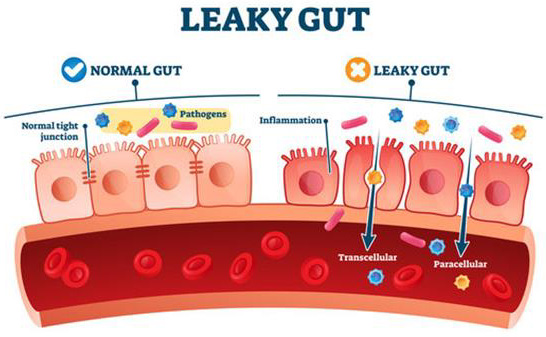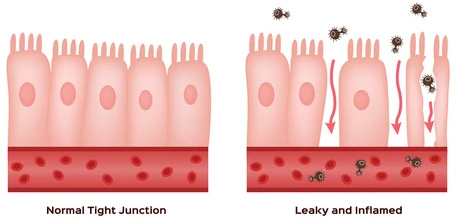Joseph R. Anticaglia MD
Medical Advisory Board
Digestion involves the intake and chewing of food, the passage of the food to the back of the mouth, and down the esophagus into the stomach. In the stomach, chemical juices break down the food into a semifluid mass (chyme) which the stomach passes on to the small intestine.
Cells that line the small intestine function as a filter system This allows nutritional substances from the intestine to enter the bloodstream while preventing harmful substances from entering our blood. But what happens when dangerous substances such as pathogens outmaneuver the filter system, and are absorbed into the blood? What is leaky gut?
Leaky Gut or Hyperpermeability
Our intestines are lined with closely positioned, epithelial junction cells that function as a semipermeable membrane, or filter system. The idea is that these cells that form our intestinal wall, or gut lining allow the good stuff, water and nutrients, to filter through to the bloodstream; and prevent harmful material such as partially digested food, toxins, or pathogens (for example, bacteria, or viruses) from gaining access to our blood.
One might compare the semipermeable membrane of the intestine to coffee filters. Coffee filters allow water and the flavorful elements of the ground coffee to pass through the filter while preventing the coffee grinds from getting into the coffee cup. Leaky gut people have weak junction cells with “holes” in their filter system causing increased permeability or hyperpermeability. The weak cells lining the gut result in the leakage of unwanted substances to enter the blood, hence the name “leaky gut.”

Anything that injuries the gut lining, and causes unwanted stuff to sieve through the filter system into the bloodstream can elicit an immune response leading to chronic inflammation and symptoms.
Symptoms
When leaky gut becomes chronic, a myriad of symptoms has been attributed to this problem some of which include diarrhea, nutrient malabsorption, fatigue and low energy, headache, bloating feeling, and a burning sensation in the gut.
Causes of gut lining injury include food allergies, poor diet, excessive use of alcohol, antibiotics or NSAIDS — nonsteroidal anti-inflammatory drugs (aspirin, ibuprofen). Also, chemotherapy, radiation therapy, and chronic inflammatory conditions such as IBS, irritable bowel syndrome, celiac disease, and HIV/Aids can contribute to leaky gut syndrome.
Treatment
There is no diagnostic test or standard treatment for leaky gut syndrome. One approach is to treat the underlying cause of leaky gut. For instance, celiac disease, and irritable bowel syndrome are associated with increased intestinal permeability. By treating the disease, one also repairs the injured gut lining.
Prevention
The following suggestions may help strengthen your gut lining.
- Follow a nutritious, well balanced diet
- Reduce your intake of refined sugars, saturated fats, processed foods, alcohol, and NSAIDS
- Increase your intake of prebiotics — specialized plant fibers (high fiber veggies) that stimulate the growth of healthy bacteria in the gut.
- Take probiotics supplements which are live microorganisms that improve, and restore the good bacteria in your small and large intestines.
- Quit smoking

Tight intestinal cellular junctions are needed to prevent harmful material leaking into our bloodstream. Hyperpermeability is present in individuals with certain chronic diseases as noted above. A healthy diet, and healthy lifestyle are measures we can take to help plug leaky gut.
References
- Michael Camilleri, MD; The Leaky Gut; Mechanisms, Measurement and Clinical Implications in Humans; Gut, August 2019
- Vicki Contie; Intestinal Mending Depends on Key Protein; NIH; October 15, 2012
- Elizabeth M. Fish; Bracken Burns. Physiology, Small Bowel; StatPearls, October 9, 2022.
- Alessio Fasano; Zonulin, regulation of tight junctions, and autoimmune diseases; Ann N Y Acad Sci. July 2012
Glossary
Leaky Gut also called increased intestinal permeability or hyperpermeability
Zonulin is a protein produced by the liver that’s involved with intestinal permeability. Bacteria in the intestines, and gluten can provoke the release of Zonulin which can lead to leaky gut.
Disease versus Syndrome: “A disease usually has a defining cause, distinguishing symptoms, and treatment. A syndrome, is a group of symptoms that might not always have a definite cause.” Traditional medicine does not recognize “Leaky Gut” as a disease.
This article is intended solely as a learning experience. Please consult your physician for diagnostic and treatment options.

